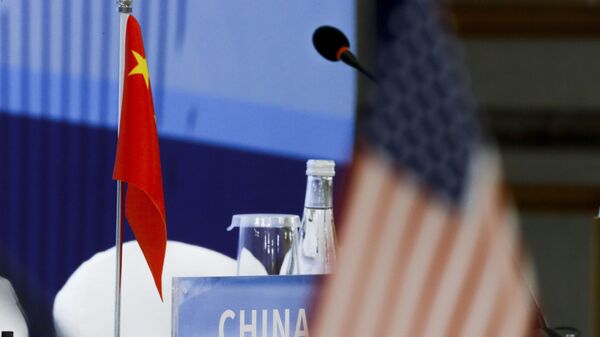Global consultancy firm Wikistrat has launch an interactive economic 'war game' between the United States and China, it was announced on Monday.
The games will take place from 8 to 12 June and include 40 of the world's top experts on China to explore an extreme trade war situation between Washington and Beijing on an online virtual platform.
According to Wikistrat, the mock scenario will see President Trump impose an embargo on high-technology trade and investment with China in 2021.
— Wikistrat (@Wikistrat) June 7, 2020
Each game will have three 24-hour rounds set to last five days to allow participants maximum flexibility to attend.
Those joining the games will choose either the US or China teams and will strategise as key figures in the respective governments and will later vote on policies to adopt at the end of each round, it said.
Actors will also need to respond to scenarios provided in each round, with responses including briefings on policy, goals, rationale and unintended consequences, Wikistrat said.
Analysis on Post-Coronavirus Relations Between US and China
The games come after a Wikistrat report in May outlined five key concerns amid the ongoing trade war, namely that Sino-US relations had dropped to its lowest level since the 1980s when relations had normalised under former US presidents Richard Nixon and Jimmy Carter along with former Chinese vice-premier Deng Xiaoping in 1979.
"The longer COVID-19 persists, the worse the relationship is going to get, and transnational emergencies of the future could be weaponized," the report read.
The US presidential elections in November could possibly see a return to normality under former vice-president Joe Biden or accelerate tensions under an incumbent Donald Trump, the report said.
But the Belt and Road Initiative could potentially bring "an effective platform" to allow China and the US to cooperate on economic recovery after the COVID-19 pandemic.
"Mercantilist" approaches to trade will affect high-tech goods, with both sides competing for market shares with a 'tech-nationalist' approach, severely affecting businesses globally, it said.
“The future of the world is going, especially after the pandemic, to depend largely on the two superpowers and the largest economies in the world, namely the United States and China. It makes no sense, absolutely no sense, for the two to have a conflict with one another,” professor Sarwar Kashmeri said at the time.
— Sarwar Kashmeri (@sarwar_kashmeri) June 1, 2020
The report comes after Washington extended its ban on Chinese tech firms such as Huawei, ZTE and many others added to an Entity List last year, with US officials citing alleged national security concerns.
The Trump administration has repeatedly accused Chinese companies of being potentially used to spy for the Chinese government, without citing evidence, which both Beijing and Huawei have repeatedly and strongly refuted.




